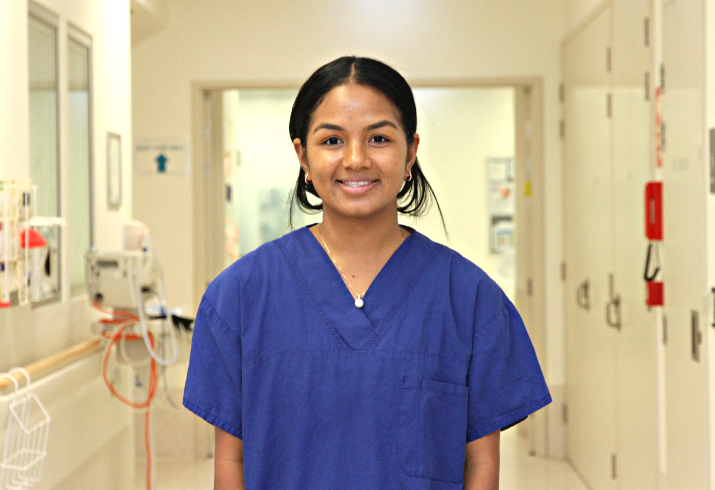Aboriginal cadet program kicking goals
 Cadet Jamiliah Bin Swani at Fiona Stanley Hospital
Cadet Jamiliah Bin Swani at Fiona Stanley Hospital
Across South Metropolitan Health Service (SMHS), we remain committed equity of access to our services and workforce for our Aboriginal community. It is our responsibility to meaningful action on behalf of our Aboriginal patients and colleagues, and our Aboriginal cadet program is just one initiative that is helping us to close the gap.
Offered to university students who identify as Aboriginal and/or Torres Strait Islander, the Aboriginal Cadetship Program offers students the opportunity to undertake work experience related to their undergraduate degree, whilst earning an income.
Hear what some of our cadets placed across SMHS have to say about the program:
Chantelle Jarmin – social work student
Second year social work student Chantelle Jarmin commenced her cadetship just one month ago, joining the Clinical Service Redesign team at Rockingham General Hospital.
Working alongside the team 1-2 days a week, Chantelle is looking forward to gaining industry experience and knowledge in a healthcare setting.
“I applied for the cadetship as I have an interest working in healthcare and wanted to gain additional experience before completing my university degree,” Chantelle said.
“So far I have found the program to be very flexible and accommodating, and am looking forward to seeing where the program takes me.”
Jamiliah Bin Swani – nursing student
After leaving full time employment to pursue studying a Bachelor of Nursing at the University of Notre Dame, Jamiliah was pleased to apply for a cadetship after learning about the program and its financial support through a colleague.
Completing her cadetship for over one year now, Jamiliah worked alongside the Health Promotion team at Fremantle Hospital (FH) in 2022, before moving to the postnatal ward at Fiona Stanley Hospital (FSH) in 2023.
Attending the cadetship just once a week, Jamiliah said the program has helped her gain real-world experience.
“At Fiona Stanley Hospital, I am observing midwifery and specialist staff as they provide postnatal care to mothers and newborns,” Jamiliah said.
“This exposure has enabled me to gain valuable experience, and when combined with theory, allows me to better understand of the content I am learning in my nursing degree.”
Paige Dhu – speech pathology student
Completing a Bachelor of Health Science - Speech Pathology (honours) at Curtin University, Paige applied for a cadetship after seeing it advertised at uni and thought it was the perfect opportunity to see what a career in WA health might look like.
Now in her fourth and final year of her degree, Paige has been part of the cadet program at SMHS for over two years, working at both FSH and FH.
“When I first started my cadetship, I worked alongside the paediatric feeding team, helping with their projects to assist with outcome measurements,” Paige said.
“Since then, I have gained vast clinical and theoretical knowledge working on projects related to voice clinics, integrated cancer services, acute neurology and rehabilitation.”
Currently placed in the State Rehabilitation Service at FSH, Paige is kept busy managing patient handovers, internal projects, meal audits and providing general assistance to the Speech Pathology team.
“Upon reflection, my cadetship has helped me understand the knowledge I have gained in my degree, which I find invaluable considering I learn visually and through experience,” Paige said.
“I encourage Aboriginal students to apply to the cadetship program as it gives you the opportunity to work in a flexible role related to your studies, whilst alleviating financial burdens.
“I understand that Aboriginal people may have a difficult relationship with the health system, however I think that one of the only ways we can have reconciliation in this area is by providing opportunities like this to have more Aboriginal people engaging and working in health care.”
Find out more about the Aboriginal Cadetship Program here (external link).


